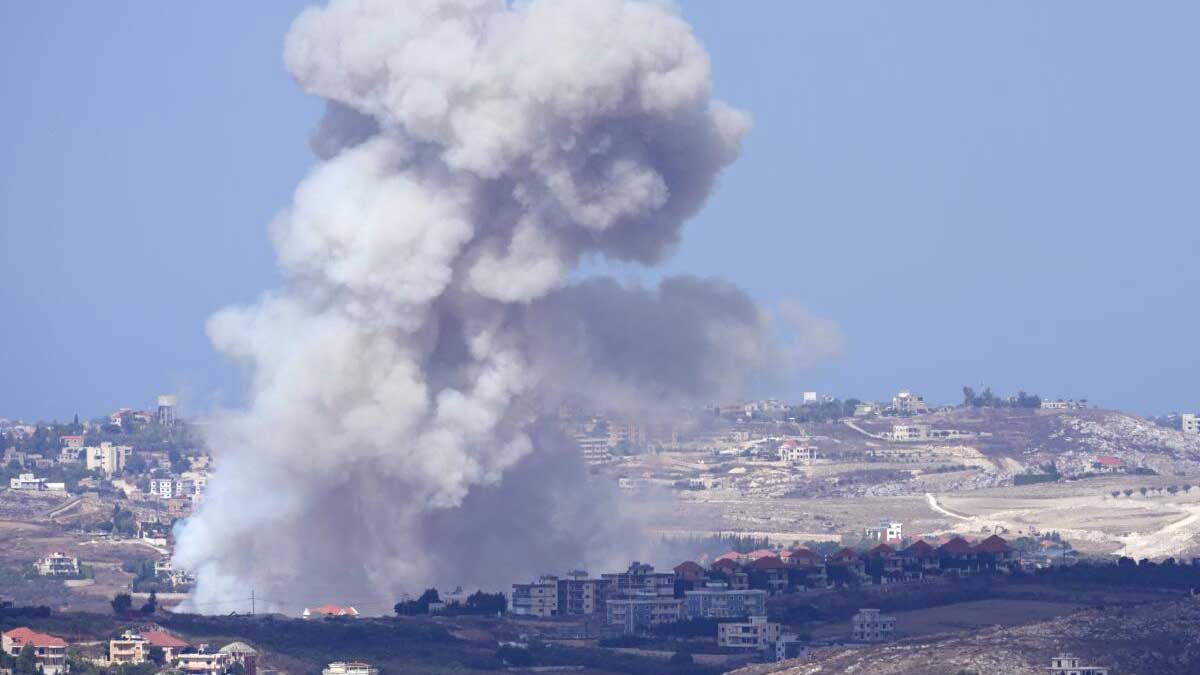- Home
- Billionaires
- Investing Newsletters
- 193CC 1000
- Article Layout 2
- Article Layout 3
- Article Layout 4
- Article Layout 5
- Article Layout 6
- Article Layout 7
- Article Layout 8
- Article Layout 9
- Article Layout 10
- Article Layout 11
- Article Layout 12
- Article Layout 13
- Article Layout 14
- Article Sidebar
- Post Format
- pages
- Archive Layouts
- Post Gallery
- Post Video Background
- Post Review
- Sponsored Post
- Leadership
- Business
- Money
- Small Business
- Innovation
- Shop
Recent Posts
Israeli Airstrikes Kill 500+ in Lebanon Amid Rising Tensions

Israeli airstrikes in southern Lebanon have led to significant devastation, with local authorities reporting over 500 deaths and tens of thousands displaced. The Israeli military has intensified its operations against Hezbollah for a second consecutive day, launching widespread airstrikes that have left at least 558 individuals dead, including 50 children and 94 women, and injured around 1,835, according to Lebanon’s health ministry.
The intense bombardment has forced a large number of civilians to flee their homes in southern Lebanon, with many seeking refuge in Beirut, the capital. The dire situation has raised concerns among international leaders, including U.S. President Joe Biden, who emphasized the need for peace in the region during a speech at the United Nations General Assembly. He stated that “full-scale war is not in anyone’s interest” and expressed hope for a diplomatic resolution between Lebanon and Israel.
The Israeli Defense Forces (IDF) have claimed to strike 1,300 Hezbollah targets in Lebanon, marking a significant escalation in military actions. On Tuesday, the IDF announced a new wave of airstrikes, stating that they were targeting strategic capabilities purportedly hidden by Hezbollah within civilian areas, including villages and homes. This military strategy has drawn international criticism due to the potential for civilian casualties.
In response to the Israeli airstrikes, Hezbollah launched rockets towards northern Israel early Tuesday morning, reportedly targeting military installations, including an explosives factory. This retaliation highlights the escalating cycle of violence between the two sides, which has left the region on edge.
UN Secretary-General Antonio Guterres remarked on the gravity of the situation, stating, “Lebanon is at the brink,” and warned that the escalation could lead to a scenario similar to Gaza, which has experienced significant humanitarian crises in recent conflicts. The international community is increasingly alarmed at the potential for Lebanon to descend into chaos, further complicating an already volatile regional landscape.
John Kirby, the White House national security spokesperson, reiterated that the U.S. does not believe an escalation of conflict is in Israel’s interest. Kirby emphasized the importance of diplomatic discussions to de-escalate tensions and ensure the safety of civilians in the region. He underscored the commitment of U.S. officials to work closely with their Israeli counterparts to facilitate commercial flights for Americans wishing to leave Lebanon amidst the conflict. The U.S. State Department has advised citizens to evacuate Lebanon due to the growing hostilities, with reports of over 30 canceled flights to and from Beirut on Tuesday.
The recent violence marks a tragic milestone, with Monday recorded as the deadliest day in Lebanon since the 2006 war between Hezbollah and Israel. This uptick in violence follows a series of smaller Israeli operations targeting Hezbollah leadership, culminating in the extensive aerial campaign launched on Monday.
In the weeks leading up to the current escalation, tensions had been rising significantly. Earlier in the week, an attack involving the simultaneous explosion of hundreds of pagers used by Hezbollah members across Lebanon and parts of Syria resulted in the deaths of at least a dozen individuals and injuries to over 2,750. Lebanese officials have attributed these attacks to Israeli forces, although Israel has not officially acknowledged responsibility. Prime Minister Benjamin Netanyahu has, however, expressed a firm commitment to neutralizing Hezbollah’s military capabilities, indicating that the Israeli government will take necessary actions to protect its citizens.
The humanitarian implications of the airstrikes and the ongoing conflict are severe. The displacement of tens of thousands of individuals has placed additional strain on already limited resources in Beirut. As civilians grapple with the loss of homes and loved ones, humanitarian organizations are calling for immediate access to aid and assistance for those affected by the violence.
The conflict has also prompted discussions regarding the broader geopolitical implications. Regional powers are closely monitoring the situation, and there are fears that an extended conflict could spill over into neighboring countries, further destabilizing the region. The possibility of a diplomatic solution remains uncertain as both sides continue to engage in hostilities, with little indication that either party is willing to make concessions in the short term.
In summary, the ongoing Israeli airstrikes in Lebanon have led to a tragic loss of life and widespread displacement. As President Biden calls for peace and a diplomatic resolution, the situation on the ground remains dire, with tensions running high and the potential for further escalation looming. The international community watches closely as the events unfold, hoping for a resolution that prioritizes the safety and wellbeing of civilians caught in the crossfire of this conflict.
Recent Posts
Categories
- 193 Countries Consortium Partner1
- 193cc Digital Assets2
- 5G1
- Aerospace & Defense48
- AI37
- Arts3
- Banking & Insurance11
- Big Data3
- Billionaires930
- Boats & Planes1
- Business332
- Careers13
- Cars & Bikes79
- CEO Network1
- CFO Network17
- CHRO Network1
- CIO Network1
- Cloud10
- CMO Network18
- Commercial Real Estate7
- Consultant1
- Consumer Tech194
- CxO1
- Cybersecurity73
- Dining1
- Diversity, Equity & Inclusion4
- Education7
- Energy8
- Enterprise Tech29
- Events11
- Fintech1
- Food & Drink2
- Franchises1
- Freelance1
- Future Of Work2
- Games149
- GIG1
- Healthcare79
- Hollywood & Entertainment203
- Houses1
- Innovation46
- Investing2
- Investing Newsletters4
- Leadership65
- Lifestyle11
- Manufacturing1
- Markets20
- Media195
- Mobile phone1
- Money13
- Personal Finance2
- Policy569
- Real Estate1
- Research6
- Retail1
- Retirement1
- Small Business1
- SportsMoney42
- Style & Beauty1
- Success Income1
- Taxes2
- Travel10
- Uncategorized12
- Vices1
- Watches & Jewelry2
- world's billionaires899
- Worlds Richest Self-Made Women2
Related Articles
South Korea Plane Crash: A Tragic Loss and Global Mourning
The tragic plane crash at South Korea’s Muan International Airport on Sunday...
By 193cc Agency CouncilDecember 30, 2024H-1B Visa Debate Splits Trump Allies and Silicon Valley
The debate over H-1B visas has once again become a contentious issue,...
By 193cc Agency CouncilDecember 28, 2024Trump Moves $4B Stake in Truth Social Parent, Stock Drops 6%
Donald Trump recently transferred his 57% stake in Trump Media & Technology...
By 193cc Agency CouncilDecember 20, 2024House Rejects Trump-Backed Funding Bill, Shutdown Looms
The U.S. House of Representatives rejected a new government funding bill on...
By 193cc Agency CouncilDecember 20, 2024













Leave a comment